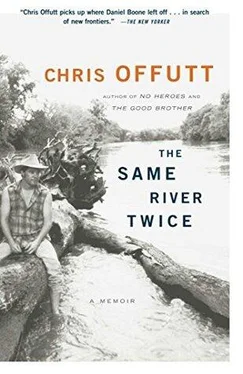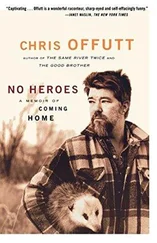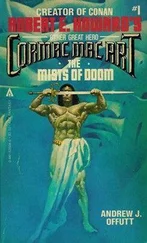Mom pressed a ten-dollar bill in my hand and dropped her head.
“Write when you get work,” she mumbled.
Birdsong spilled from the wooded hills. I began walking, the pack on my back angled like a cockeyed turtle shell. A pickup stopped and hauled me out of Kentucky. The hills relaxed their taut furls, billowing gently like sheets on a clothesline, I had a fresh haircut, two hundred dollars, and a grade school photograph of Jennipher. I was already homesick.
When I told drivers that I was heading for New York to be an actor, they grinned and shook their heads. A trucker pointed to the radio and told me to act like I was turning it on. I slept under a tree in Ohio and camped the next night behind a truck stop in Pennsylvania. On the third day, I entered the Holland Tunnel.
The world on the other side was so alien that my chief advantage was the ability to speak and read English. My accent’s raucous twang betrayed me. I vowed to eliminate the guttural tones, swallowed endings, and stretching of single-syllable words. Until then, I remained silent. Manhattan was filthy and loud but similar to the hills: packed with illiterate men, unattainable women, and threat of injury. I regarded avenues as ridges, and the cross streets as hollows. Alleys were creeks that trickled into the river of Broadway. New York wasn’t that big, just tall.
Like most groups of immigrants, Kentuckians abroad form a tight community that helps newcomers. Having left family and land, we could not quite rid ourselves of the clannish impulse dating back to the Celts. We still roved the civilized world, but no longer painted ourselves blue before the attack. I moved into an apartment on the Upper West Side with three natives of Kentucky. They were graduates of the college I’d quit, older students I vaguely knew, struggling actors. They let me sleep on the couch. The halls between apartments were so narrow that if two people met, both had to turn sideways for passage. More people lived in my building than on my home hill.
The city seemed predicated upon one’s innate ability to wait, a learned craft, routine as tying a shoe. You had to wait for a buzzer to enter a building, wait for the subway, wait for an elevator. I stood for two hours in a movie line only to learn that it was sold out and the line was for the next showing, two more hours away. Groups of people rushed down subway steps, then stood perfectly still. They rushed onto the train, and again became immobile until their stop, whereupon they’d rush out. The waiting was more exhausting than motion. People hurried, I decided, not because they were late but because they were sick of standing still.
The simple act of walking became a problem for me. I kept bumping into people, often tripping them or myself. I’d never had this problem before, possessing if not grace, at least a certain agility and physical awareness. It seemed as if people rushed into my path. One Saturday I sat on a bench at mid town and watched pedestrians, seeking insight. My error was a long, steady stride, necessary to cover the open ground of home. I simply set myself in motion and put my legs to work. New Yorkers took quick, short steps. They darted and danced, stopped short and sidestepped, constantly twisting their torsos and dipping their shoulders to dodge people. Since everyone was likewise engaged, the whole comedic street dance worked. I took a bus home and practiced in my room. As long as I concentrated, everything was jake, but the minute my attention wavered, my gait lengthened and someone’s legs entangled with mine.
I spent another two hours observing foot traffic and noticed that most New Yorkers possessed a morbid fear of automobiles. They assiduously avoided the curb, which left a narrow open lane at the edge of the sidewalk. I began walking as close to the gutter as possible.
My roommates were seldom home. To show appreciation for having been taken in, I decided to wash everyone’s laundry. The laundromat was a narrow chamber, very hot. I was the only white person and the only male. Conversation around me was incomprehensible. I’d read about black dialects of the inner city and was pleased in an odd way that I couldn’t understand what was being said. English had been melted and recast into their own tongue. It reminded me of being home. I wanted to tell the women that my native language was equally enigmatic to outsiders.
Folding laundry was a skill I lacked, and I started with the sheets, believing them to be easier. My arms weren’t long enough to span the sheet and it dragged the floor. I tried to fold it like a flag, draping one end over the table and working forward. The table didn’t provide enough tension and again the sheet slipped to the floor. I sorted a few socks while considering the problem.
Controlling the four corners of the sheet was essential, which led to a plan of theoretic elegance. I doubled the sheet and held two of its corners. I spread my legs, mentally counted to three, and threw the sheet into the air, snapping my wrists. The sheet unfurled and arced back. I caught one corner but missed the other. Encouraged, I took a deep breath and concentrated, knowing that I needed a slight correction in toss and grab. As I threw the sheet, someone entered the laundromat, producing a strong draft. The sheet blew over my head and shoulders. I dropped one corner. Unable to see, I stepped forward, placed my foot on the sheet and not so much fell as actually pulled myself to my knees, I jerked the sheet off my head. Above the cacophony of washers and dryers came the pearly sound of women laughing.
They walked past me and started folding my laundry. Perfect columns of T-shirts began to rise on the table. With an unerring sense of size, the women sorted the pants into stacks corresponding to my roommates and me. They refused my assistance and talked among themselves, I listened carefully, trying to isolate a word or phrase, but they spoke too fast for me to follow. They moved to their own chores without looking at me, as if embarrassed by their benevolence. I approached the nearest woman and thanked her. She nodded.
“I’m from Kentucky,” I said. “It’s not like New York.”
“Nothing is.”
“How did you learn to fold clothes so well?”
“My mother taught me.”
“In Harlem?”
Her eyes widened and her lips drew tight across her teeth, I realized the stupidity of assuming that all blacks grew up in Harlem, like thinking all Kentuckians came from Lexington or Louisville. She bent to her work, her face furious.
“I’m sorry,” I said. “Maybe not Harlem.”
“No! Not Harlem.”
“Where, then?”
“Puerto Rico. I am Puerto Rico!” She lifted her arms to include everyone in the laundromat. “Puerto Rico!”
“Puerto Rico,” I said.
“Sí.”
I leaned against the table, absolutely clobbered by an awareness that they’d been speaking Spanish, During the next few days, I wandered the blocks near my building. It was not a black neighborhood as I’d previously thought. Everyone was of Hispanic descent, but I felt more comfortable here than among the white people. My culture had much in common with the Latin — loyalty to a family that was often large, respect for the elderly and for children, a sharp delineation between genders. The men were governed by a sense of machismo similar to that which ruled in the hills. There was one quite obvious drawback — to them I was just another white man.
The random progress of a nose-down dog dropped me into a job on the Lower East Side of Manhattan. Belched from the subway each morning, I strolled the Bowery past dozens of men dirty as miners. Many could not speak. Each payday, I gave away two packs’ worth of cigarettes, one at a time.
For six months I worked at a warehouse in the neighborhood, the first full-time job of my life. I collected clothing orders for a professional shipping clerk with forty years’ experience. His passive numbness frightened me. I was a gatherer of shirts and slacks; he was a hunter of numbers. The day’s highlight was staring at a Polaroid of a nude woman I’d found on the street. Ancient priests of South America used fake knives and animal blood to save the sacrificial virgins for themselves. Up north I just wanted a goddess to worship.
Читать дальше












